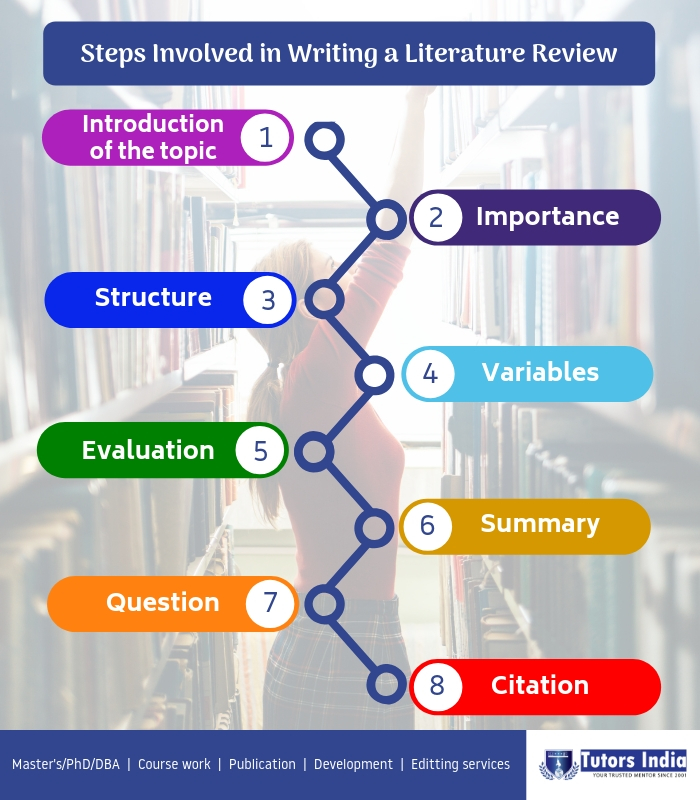Constructing Your Literature Review and Theoretical Framework
A Literature Review Writing is essentially an exercise of writing a review after going through materials recorded or written on a particular subject. It is not only about giving out a synopsis of existing information but also recording your interpretation of the same. It enables you to understand the present scope of the field in question and fuels further research, in case the topic warrants it. Although it may sound like a term used to describe the act of penning down your thoughts and analysis after reading a striking book or a poem, it is not what it is about.
If you are an academic or on the way to becoming one, you might have already come across the terms it is an integral part of conducting any kind of research.
A literature review does cut across various fields and areas, but it is more prevalent in the field of science. This is simply because science offers humongous scope when it comes to research and conducting a study on something that has been proven already might lead to duplication of data. Along with preventing it, a literature review also underlines the things that can be taken up for research.
Benefits of Literature review
As a student, if you are looking to begin your research work on a particular topic, you must have defined goals for your paper. In such a scenario, constructing a literature review will help you
- Discover the possibilities that the field has to offer.
- Identify the gaps within and select a relevant topic.
- Mark the extent of your research.
- Understand how the research has been done.
- Comprehend the relationship between various contributions to your topic.
- Choose a research paper to develop your argument/base your thesis on.
- Evaluate the importance of your research.
Additionally, if you are a professional, an academician or simply just an enthusiast, reading literature reviews will ensure you stay updated with the happenings of the field that is of concern to you.
Important Elements in a Literature Review
When it comes to writing an effective literature review, there are certain elements, which are of mighty importance, that you ought to include. Some of them are listed down below.
- Objectives: Make a list of your objectives for constructing the literature review, and provide a basic sketch of the topic.
- Elucidation: Elucidate the opposing views found in multiple sources rather in detail and explain the common thread amongst variables, if any.
- Conclusion: The primary objective of any review is to arrive at a particular conclusion. Once you go through all the scholarly materials, make a conclusion as to which one of them was more convincing with their theory.
Steps involved in writing a literature review
Here are some steps that you might want to follow when you are all set to construct a literature review.
- Introduction of the Topic: Give an extensive introduction to the topic that you are working on. This will help the reader get a sense of what the project is about.
- Importance: It is necessary to write about the significance of your topic and the contribution it will make to the concerned field. Achieving that at the end of the research should be your primary objective.
- Literature Review Structure: Chart out a structure for your review and categorise the obtained data and your findings accordingly. Stick to it to avoid deviation from the topic.
- Variables: Explain in detail about the variables and the relationship between them. You should also elucidate the research connected to these variables.
- Evaluation: Needless to say, a critique of the theories chosen by you for study must form the bigger part of your literature review.
- Summary: Write a brief summary of the things that are present and otherwise. Also, paint a clear picture of the scope of the subject.
- Question: You must state a question based on your comprehensive understanding of all studies; it can act as a starting point for your research.
- Citation: List all the sources studied for review and give credits wherever it is due. Leaving out anything can mean plagiarism.
Pointers
Although writing literature reviews is only a part of the project, it can be more daunting than finishing the core project itself. This is understandable for it determines how the project must move forward.
Here are some pointers that you can use when you find the whole process overwhelming.
- Questions: Ask yourself as to what type of research you want to do. It can be anything from qualitative to quantitative in acknowledging problems in a particular theory.
- Scope: Make an effort to understand the extent of scope that your topic offers.
- Topic: Keep it as specific as possible. It is not a good idea to aim to cover everything pertaining to a single topic.
- Materials/Sources: Get as many relevant materials as you can to review. Make use of all sources including journals. More often than not, different interpretations on the same subject might change your perspective towards the same. Similarly, keep track of the materials that you have with you.
- Critical Analysis: Do not write a mere description of those studies, including your opinions on them and record all their weaknesses and strengths.
- Organisation: Organise all your sources in some order. You can categorise them chronologically, by publication, by methods or themes.
Mistakes to avoid
Listed below are some of the commonly made mistakes while constructing a review.
- Disjointed Arguments: Including a series of disjointed arguments. It will lessen the significance of your argument.
- Connection: Not establishing a very clear connection between the literature and your research even though it is extremely critical.
- Irrelevant References: Including references that are no longer relevant and outdated.
- Plagiarism: Including references without any citation, using the author’s exact phrases without making any changes, using quotes to denote that the words belong to someone else but not giving credits to them.
- Incoherent: Writing a review that’s absolutely incoherent and lack of flow in your arguments.
Avoid these basic mistakes to produce an effective review.
Theoretical Framework
Any framework, generally, aims at sealing the basics of a project to ensure that you do not deviate from the primary objective. Similarly, a theoretical framework is essential as it guides your project towards fulfilling its goal.
A theoretical framework can be defined as a set of concepts that are related to a certain topic. It determines that variables that ought to be measured, the relationships that you want to establish between them.
There is a misconception surrounding the relevance of theoretical frameworks. You need not have a theoretical framework only when you are testing a theory, you can have them for all sorts of studies including qualitative, quantitative etc.
Benefits of Theoretical Framework
Here are some of the benefits of constructing a theoretical framework for your research.
- Perspective: It provides a clear perspective for you to research your topic and thereby, helps to choose the right set of theories.
- Justification: Your theoretical framework will justify your choice of topic by giving out sufficient data about similar theories to the reader.
- Better Analysis: Since your framework will determine the methods that you need to adopt to measure the variables of your research, you will end up analysing better.
- Acknowledging Limitations: It helps you in acknowledging the limitations of your study and shaping it accordingly.
- Points out Errors: It points out glaring errors and overlooked questions in your research.
Construction of a Theoretical Framework
- Information: Use your literature review and information you have gathered concerning the topic of your research to develop your theoretical framework.
- Case Study: Pick a case and describe it to explain your basic research question.
- Application of Deductive and Inductive Logic: If your study is quantitative, you apply deductive logic to it. It means you apply a theory to test a particular case. On the other hand, inductive logic means, you ought to apply facts to arrive at a theory based on observations.
- Include Names: Include the names of the authors of the chosen theories.
- Describe Approaches: You have to describe the methods or approaches you are going to adopt to prove your case.
If you are in the process of writing a dissertation, the above facts will surely assist you in writing the right literature review and a perfect theoretical framework. If still, you need further guidance, seek the help of Literature Review Writing Service. We will make assist you in writing your dissertation applying the appropriate and best literature review and a laudable literate review.


